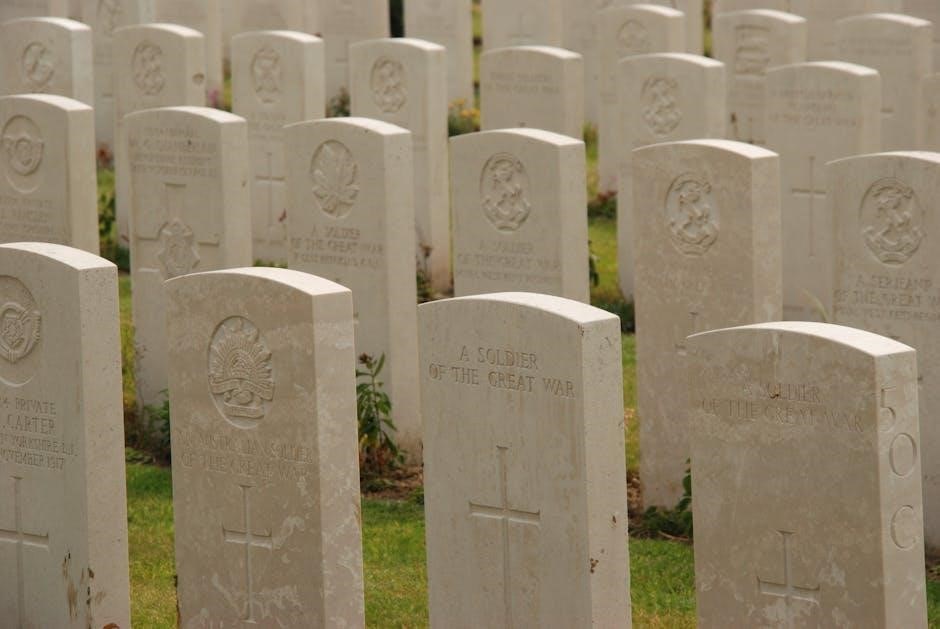
the sacrifice pdf
The concept of sacrifice transcends cultures and religions‚ embodying profound emotional‚ spiritual‚ and societal significance. The Sacrifice PDF explores its universal themes‚ offering insights into its historical roots and modern relevance. By examining sacrifice through various lenses‚ this resource provides a comprehensive understanding of its enduring impact on humanity.
Overview of the Concept of Sacrifice
Sacrifice‚ a universal and timeless concept‚ involves giving up something valuable for a greater purpose or belief. It spans religious‚ cultural‚ and personal contexts‚ often reflecting deep emotional or spiritual commitments. The internet highlights how sacrifice can be both voluntary and involuntary‚ sometimes driven by faith or societal expectations. For instance‚ religious texts describe divine requests that test devotion‚ while personal relationships may involve compromises for loved ones. Historical practices‚ such as those in Aztec and Mayan cultures‚ illustrate sacrifice as a means to connect with the divine or ensure prosperity. The act of sacrifice often carries symbolic meaning‚ representing dedication‚ love‚ or atonement. It can also evoke complex emotions‚ from fulfillment to anguish‚ depending on the context. The concept remains relevant today‚ as individuals and communities continue to grapple with its significance in their lives‚ making it a rich topic for exploration in resources like The Sacrifice PDF.
Relevance of Sacrifice in Modern Times
Sacrifice remains a deeply relevant concept in contemporary life‚ transcending its historical roots. In modern times‚ individuals often make personal sacrifices for career goals‚ relationships‚ or societal expectations. The internet highlights how people navigate emotional and mental challenges when giving up something valuable‚ reflecting the psychological weight of sacrifice. Cultural practices‚ though evolved‚ still incorporate symbolic acts of sacrifice‚ such as charitable giving or volunteering‚ to foster community bonds. Additionally‚ the digital age has redefined sacrifice‚ with individuals sacrificing privacy or convenience for technological advancements. The concept also persists in religious contexts‚ where faith-driven sacrifices remain a testament to enduring spiritual values. Thus‚ sacrifice continues to shape modern identities‚ decisions‚ and societal norms‚ proving its timeless and universal appeal. This relevance underscores the importance of exploring sacrifice in contemporary discourse‚ as seen in resources like The Sacrifice PDF.
Objective of Exploring “The Sacrifice PDF”
The primary objective of exploring The Sacrifice PDF is to gain a deeper understanding of the concept of sacrifice and its multifaceted implications. By delving into this resource‚ readers can uncover the universal themes that drive sacrificial acts‚ whether personal‚ religious‚ or cultural. The PDF aims to bridge the gap between historical practices and modern interpretations‚ offering insights into how sacrifice shapes individual and collective identities. It also seeks to illuminate the psychological and emotional dimensions of sacrifice‚ helping readers grapple with the complexities of giving up something valuable. Through its analysis of cultural rituals‚ religious narratives‚ and personal stories‚ The Sacrifice PDF provides a comprehensive framework for understanding sacrifice as both a historical and contemporary phenomenon. This exploration encourages reflection on the significance of sacrifice in fostering empathy‚ resilience‚ and spiritual growth‚ making it a valuable resource for anyone seeking to appreciate its enduring relevance.

Historical Context of Sacrifice
Sacrifice has deep historical roots‚ featuring prominently in ancient cultures as a means of appeasing deities and ensuring prosperity. Historical texts highlight its significance and rituals.
Ancient Practices and Rituals
Ancient cultures often engaged in sacrificial rituals to appease deities‚ ensure prosperity‚ and maintain cosmic balance. These practices varied widely‚ from offering animals and crops to more extreme forms like human sacrifice. High places were frequently used for such rituals‚ symbolizing a connection between the earthly and divine realms. In some societies‚ sacrifice was a communal act‚ reinforcing social cohesion and religious devotion. The wilderness also played a role‚ with many believing that a “sacrificial attitude” in such settings could lead to spiritual growth. Historical texts reveal that practices like these were not isolated but widespread‚ with examples found in ancient India and China. These rituals often carried deep emotional and spiritual significance‚ reflecting the intricate relationship between humanity and the divine.
The Role of Sacrifice in Early Civilizations
Sacrifice played a pivotal role in shaping early civilizations‚ serving as a means to connect with the divine and ensure societal stability. Many ancient cultures believed that offering sacrifices could appease deities‚ guarantee fertility‚ and maintain cosmic balance. High places were often designated for these rituals‚ symbolizing a bridge between the earthly and spiritual realms. Sacrifice also reinforced social hierarchies and communal bonds‚ as it was frequently a collective act. Early civilizations viewed sacrifice as essential for survival and prosperity‚ with practices varying from animal offerings to‚ in some cases‚ human sacrifice. These acts were deeply intertwined with religious beliefs and cultural identity‚ reflecting the profound importance of sacrifice in the development of human societies. The willingness to surrender valuable resources underscored the gravity of these rituals‚ which were often seen as vital for sustaining life and order.
Examples from Aztec and Mayan Cultures
The Aztec and Mayan civilizations provide striking examples of sacrifice‚ deeply rooted in their religious and cultural systems. Aztec rituals often involved human sacrifice to appease deities like Huitzilopochtli‚ believing it ensured the sun’s rise and the fertility of their lands. Victims were typically prisoners of war or slaves‚ and their hearts were offered to the gods. Similarly‚ the Mayans practiced sacrifice to maintain balance and harmony in the universe. Their rituals included offerings of animals‚ sacred objects‚ and‚ in some cases‚ humans‚ often tied to astronomical events or royal ceremonies. These practices underscored the central role of sacrifice in maintaining cosmic order and communal well-being‚ reflecting the profound spiritual and cultural significance of these acts in ancient Mesoamerican societies.
Human Sacrifice in Historical Texts
Historical texts reveal that human sacrifice has been a practice in various cultures‚ often tied to religious or ceremonial purposes. The Sacrifice PDF examines accounts from ancient civilizations‚ such as the Aztecs and Mayans‚ who believed human offerings were necessary to appease gods and maintain cosmic balance. These rituals were documented in texts like the Popol Vuh and Aztec codices‚ detailing the ceremonial procedures and their spiritual significance. Similarly‚ ancient Hindu and Vedic texts reference human sacrifice as a means to honor deities‚ though such practices were later discouraged. Religious narratives‚ such as the story of Abraham and Isaac‚ also illustrate the theme of divine sacrifice‚ emphasizing faith and obedience. These historical records highlight the complex and often controversial role of human sacrifice in shaping cultural and religious identities.

Religious Perspectives on Sacrifice
The Sacrifice PDF delves into how major religions interpret sacrifice‚ highlighting its spiritual significance. Christianity‚ Islam‚ Judaism‚ and Hinduism each offer unique narratives‚ emphasizing faith‚ devotion‚ and divine connection.
Christianity: The Ultimate Sacrifice
In Christianity‚ sacrifice is central‚ epitomized by Jesus Christ’s crucifixion‚ viewed as the ultimate act of divine love and redemption. The Sacrifice PDF explores how this event symbolizes substitutionary atonement‚ where Jesus bore humanity’s sins to restore unity with God. The PDF highlights how early Christians embraced sacrifice as a profound expression of faith‚ often surrendering worldly desires to follow Christ’s teachings. It also touches on modern Christian perspectives‚ where sacrifice is seen as a way to emulate Christ’s selflessness‚ whether through service‚ forgiveness‚ or devotion. By examining biblical accounts and theological interpretations‚ The Sacrifice PDF provides a deeper understanding of how sacrifice remains a cornerstone of Christian faith and practice‚ inspiring believers to live with purpose and humility.
Islam: The Story of Ibrahim and Ismail
In Islam‚ the story of Prophet Ibrahim and his son Ismail is a profound example of sacrifice and unwavering faith. The Sacrifice PDF delves into how Ibrahim was tested by Allah‚ being commanded to sacrifice his beloved son Ismail. Ismail’s willingness to submit to Allah’s will‚ even in the face of death‚ underscores the essence of Islamic sacrifice. This narrative is deeply revered in Islamic tradition and is commemorated during Eid al-Adha. The Sacrifice PDF explores how this story reflects the broader Islamic teachings on submission to divine command and the value of trust in God’s plan. It also highlights the universal message of sacrifice as an act of love‚ faith‚ and obedience‚ resonating with believers across cultures and generations. This story remains a cornerstone of Islamic faith‚ inspiring reflection and devotion.
Judaism: The Sacrifice of Animals
In Judaism‚ animal sacrifice was a central religious practice‚ rooted in the Torah and performed to atone for sins‚ fulfill vows‚ or express gratitude; The Sacrifice PDF examines how these rituals were meticulously detailed‚ with specific animals designated for different types of sacrifices‚ such as burnt offerings and sin offerings. The act of sacrifice was not merely a physical ritual but a spiritual expression of devotion and submission to God’s will. The destruction of the Temple in Jerusalem marked the end of animal sacrifices‚ shifting Jewish practice toward prayer and study. The Sacrifice PDF highlights how these historical practices continue to influence Jewish thought and worship‚ emphasizing the enduring significance of sacrifice as a symbol of faith and covenant with the divine. This exploration provides a deeper understanding of Judaism’s rich sacrificial heritage.
Hinduism: The Concept of Yajna
In Hinduism‚ the concept of Yajna embodies the idea of sacrifice as a sacred ritual and a means to connect with the divine. Literally meaning “worship” or “offering‚” Yajna involves the sacrifice of material substances‚ such as grains‚ ghee‚ or herbs‚ into a sacred fire. This ritual is rooted in the Vedic tradition and is believed to purify the environment‚ fulfill duties‚ and maintain cosmic order. The act of Yajna is not only a physical sacrifice but also a spiritual discipline‚ fostering self-reflection and devotion. It is performed to honor deities‚ seek blessings‚ or attain spiritual growth‚ emphasizing the importance of giving and selflessness. The Sacrifice PDF explores how Yajna reflects Hinduism’s profound understanding of sacrifice as a path to harmony and divine connection. This ancient practice continues to inspire modern interpretations‚ blending tradition with contemporary spirituality.

Psychological Impact of Sacrifice
Sacrifice can impose emotional and mental strain‚ yet it often fosters resilience and personal growth. Faith plays a crucial role in helping individuals find purpose and meaning in their sacrifices.
The Role of Faith in Sacrifice
Faith is a cornerstone of sacrifice‚ often providing the strength to act beyond personal understanding. It fuels devotion‚ enabling individuals to trust in a higher purpose‚ even when outcomes are unclear. Sacrifice‚ driven by faith‚ fosters resilience and spiritual growth‚ as seen in religious practices like tithing or acts of devotion. The willingness to surrender comfort or desires for a greater cause reflects deep trust in divine plans. This mindset helps individuals navigate life’s challenges‚ finding meaning in their sacrifices. Faith not only justifies sacrifice but also offers emotional and spiritual solace‚ making it a vital component of personal and collective journeys. Through faith‚ sacrifice becomes an act of love‚ commitment‚ and transformative power.
Emotional and Mental Effects on Individuals
Sacrifice often evokes profound emotional responses‚ ranging from fulfillment to inner conflict. It can deepen one’s sense of purpose but may also lead to emotional strain. Individuals may experience guilt‚ sadness‚ or frustration when surrendering personal desires for others. Mentally‚ sacrifice can foster resilience and selflessness‚ yet it may also trigger feelings of martyrdom or burnout if not balanced. The act of giving up something valuable can create a sense of loss‚ even when motivated by love or duty. Faith and trust in a higher purpose often mitigate these challenges‚ offering emotional solace and mental clarity. Ultimately‚ sacrifice shapes an individual’s emotional and mental landscape‚ influencing their ability to cope with life’s demands and find meaning in their choices. This duality underscores the complex interplay between sacrifice and personal well-being.
Understanding Personal Sacrifices
Personal sacrifices involve giving up something cherished for the benefit of others or a greater cause‚ often requiring immense emotional and mental fortitude. These acts can stem from love‚ duty‚ or faith‚ but they frequently evoke feelings of loss and self-doubt. The decision to sacrifice personally can lead to profound introspection‚ forcing individuals to question their priorities and values. While personal sacrifices may bring fulfillment‚ they can also result in emotional strain or resentment if not acknowledged. The Sacrifice PDF highlights how individuals navigate these challenges‚ emphasizing the importance of balance and self-care. Sacrificing for others can foster personal growth and resilience‚ but it is crucial to ensure that such acts do not diminish one’s own well-being. Ultimately‚ understanding personal sacrifices requires empathy‚ self-awareness‚ and a willingness to embrace the complexities of giving and receiving.

Cultural Significance of Sacrifice
Sacrifice holds profound cultural significance‚ reflecting societal values‚ maintaining harmony‚ and connecting communities to their heritage and divine entities through symbolic and ritualistic acts and beliefs.
Cultural Rituals and Traditions
Cultural rituals and traditions surrounding sacrifice vary widely‚ reflecting the unique beliefs and practices of societies worldwide. Many ancient cultures‚ such as the Aztecs and Mayans‚ practiced elaborate sacrificial ceremonies to appease deities‚ ensure fertility‚ and maintain cosmic balance. Similarly‚ in Hinduism‚ the concept of yajna involves sacrificial offerings to gods as an act of devotion and reciprocity. These rituals often symbolize renewal‚ purification‚ and the community’s commitment to its faith. Sacrifice in these contexts is deeply intertwined with cultural identity‚ reinforcing social bonds and moral frameworks. Even in modern times‚ symbolic sacrifices persist‚ such as fasting or charitable acts‚ demonstrating the enduring significance of sacrificial traditions in shaping cultural narratives and spiritual practices.
Symbolism in Sacrificial Acts
Sacrificial acts are rich in symbolism‚ often representing profound spiritual‚ emotional‚ and cultural meanings. In many religions‚ sacrifice symbolizes devotion‚ redemption‚ and the surrender of earthly desires for a higher purpose. For instance‚ in Christianity‚ Christ’s sacrifice embodies divine love and the forgiveness of sins. Similarly‚ in Islam‚ the story of Ibrahim and Ismail signifies unwavering obedience and faith. Beyond religion‚ personal sacrifices often symbolize love‚ commitment‚ and selflessness‚ as seen in relationships where individuals prioritize others’ needs above their own. Culturally‚ sacrificial acts may represent renewal‚ atonement‚ or the pursuit of harmony with the divine. These symbolic dimensions highlight the transformative power of sacrifice‚ transcending physical acts to touch the heart of human existence and spirituality. Through symbolism‚ sacrifice becomes a universal language‚ bridging the material and the sacred.
Modern Interpretations of Sacrifice
Today‚ sacrifice is often viewed as a personal choice rather than a societal or religious obligation. Modern interpretations emphasize individual agency‚ where people sacrifice for personal growth‚ relationships‚ or career goals. The concept has evolved to include acts like volunteering‚ donating to charities‚ or pursuing environmentally sustainable lifestyles. In relationships‚ sacrifice may involve compromising personal desires for the well-being of a partner or family. Professionally‚ individuals might sacrifice work-life balance for career advancement. These contemporary interpretations highlight sacrifice as a means to achieve fulfillment and purpose in a secular world. The idea of sacrifice has also been embraced in mental health discussions‚ where letting go of harmful habits or toxic relationships is seen as a form of self-sacrifice for healing. This modern lens underscores the adaptability of sacrifice‚ making it relevant in diverse contexts of life.

The Concept of Sacrifice in “The Sacrifice PDF”
The Sacrifice PDF delves into the profound exploration of sacrifice‚ examining its universal themes and personal significance. It highlights how sacrifice shapes identity‚ relationships‚ and societal expectations‚ offering insights into its cultural and emotional dimensions.
Key Themes and Messages
The Sacrifice PDF explores themes of devotion‚ redemption‚ and personal growth‚ highlighting the emotional and psychological depths of sacrifice. It examines how sacrifice shapes identity‚ fosters resilience‚ and strengthens relationships. The text emphasizes the universal human struggle to balance self-interest with the greater good‚ offering insights into the cultural and spiritual significance of sacrifice. By delving into personal and societal expectations‚ the PDF provides a nuanced understanding of sacrifice as both a voluntary act of love and a necessary step toward transformation. Ultimately‚ it encourages readers to reflect on their own sacrifices‚ whether in relationships‚ careers‚ or spirituality‚ and to find meaning in their choices. The PDF serves as a thought-provoking guide to navigating sacrifice in modern life.
Analysis of the PDF’s Content
The Sacrifice PDF presents a detailed exploration of sacrifice‚ blending historical‚ cultural‚ and personal perspectives. The content is structured to guide readers through the complexities of sacrifice‚ offering both theoretical insights and practical examples. It examines how sacrifice has shaped human history‚ from ancient rituals to modern-day acts of devotion. The PDF also delves into the emotional and psychological aspects of sacrifice‚ highlighting its impact on individuals and communities. By incorporating real-life stories and philosophical reflections‚ the document provides a holistic understanding of sacrifice. Its balanced approach ensures that readers can relate to the concept on a personal level while gaining a broader societal perspective. The PDF’s content is both informative and thought-provoking‚ making it a valuable resource for those seeking to understand the significance of sacrifice in various contexts.
Reception and Impact of the PDF
The Sacrifice PDF has garnered significant attention for its thought-provoking insights into the concept of sacrifice. Readers have appreciated its ability to connect historical and cultural practices with modern-day relevance. The document has sparked meaningful conversations across diverse audiences‚ including religious groups‚ scholars‚ and individuals seeking personal growth. Its impact lies in its ability to bridge the gap between theoretical concepts and real-life applications‚ making it accessible to a wide range of readers. Many have found the PDF to be a valuable resource for understanding the emotional and spiritual dimensions of sacrifice. Its reception highlights the enduring importance of exploring such universal themes‚ encouraging deeper reflection and dialogue about the role of sacrifice in human life. The PDF’s influence continues to grow as it resonates with those seeking to understand sacrifice’s profound significance.
Sacrifice is a profound concept that shapes human experiences across cultures and religions. The Sacrifice PDF offers a comprehensive exploration‚ blending history‚ religion‚ and modern relevance‚ inspiring deeper reflection on its enduring significance in our lives.
Sacrifice holds enduring significance across cultures and religions‚ reflecting deep moral and spiritual values. It embodies selflessness‚ commitment‚ and faith‚ often inspiring personal growth and transformation. Through sacrifice‚ individuals demonstrate devotion‚ whether to a higher power‚ a community‚ or a cause. This act fosters resilience and unity‚ as seen in historical and modern contexts. Sacrifice also highlights the human capacity for empathy and altruism‚ shaping societal norms and cultural identity. Its universal relevance underscores its power to transcend time‚ connecting past and present. Ultimately‚ sacrifice serves as a profound expression of love‚ duty‚ and belief‚ offering insights into the essence of humanity and our shared experiences. Its importance lies in its ability to inspire and unite‚ making it a cornerstone of both individual and collective journeys.
Final Thoughts on the Relevance of Sacrifice
Sacrifice remains a profound and enduring concept‚ transcending time and culture. It reflects humanity’s capacity for selflessness‚ faith‚ and commitment to higher values. Whether in religious contexts‚ personal relationships‚ or societal challenges‚ sacrifice demonstrates the depth of human devotion and resilience. Its relevance today lies in its ability to inspire growth‚ foster unity‚ and provide meaning in a rapidly changing world. Sacrifice bridges the gap between individual and collective experiences‚ emphasizing the importance of empathy and altruism. Through The Sacrifice PDF‚ this timeless theme is explored‚ offering insights into its universal significance and its continued impact on modern life. Sacrifice‚ in all its forms‚ reminds us of the power of love‚ duty‚ and belief in shaping our shared human journey.
Encouragement for Further Exploration
Exploring the concept of sacrifice offers a deeply rewarding journey into the heart of human experience. By engaging with The Sacrifice PDF‚ readers can gain a richer understanding of its cultural‚ religious‚ and personal dimensions. Sacrifice‚ as depicted in various traditions‚ invites us to reflect on our values‚ beliefs‚ and relationships. It encourages empathy‚ self-reflection‚ and a deeper appreciation for the complexities of human commitment. Whether through religious narratives‚ historical practices‚ or personal acts of devotion‚ sacrifice challenges us to grow and connect on a profound level. This resource serves as a compelling starting point for further exploration‚ inspiring readers to uncover the universal truths embedded in sacrifice. Embrace the opportunity to delve into this timeless theme and discover its transformative power in shaping lives and societies.